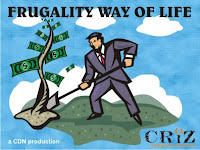ls Recession-Induced Frugality Sustainable?
| May 5, 2009 | Posted by Roshawn Watson under Uncategorized |
 By: Roshawn Watson
By: Roshawn Watson
The party is over
For the last 25 years, our destructive habits of financial excess and self-indulgence have characterized the nation. We’ve been guilty of overleveraging, overspending, having no sense of delayed gratification, and a negative savings rates. Nonetheless, our awareness of our atrocities was lessened by rising home values, ballooning 401Ks, and access to easy money. It was a bit naive anyway to believe that consumers would indefinitely be able to or willing to fund the economic prosperity by staying ridiculously financially overextended. Thus, the boom was unsustainable.
For years, enthusiasts for unfettered capitalism have insisted that the withering away of enterprises and entire industries is a healthy and necessary part of a vibrant, self-correcting economic system; …we must endure the shocking and awesome pain of that metamorphosis. After decades of talking the talk, now we’re all obliged to walk the walk. (Kurt Anderson, host of Studio 360)
…we surely will have to adjust the ways we think of ourselves. Still an exceptional country, absolutely, but not a magical one exempt from the laws of economic and geopolitical gravity. (Kurt Anderson, host of Studio 360)
No. No. No, frugality is definitely not bad. Some people sneer at the mention of frugality. Mentally, they get images of miserly individuals who hoard out of fear. We all know a few who are just really tight with money. Their primary motivation in any purchase is costs, not quality, because they fear running out. I would argue they are cheap not frugal.
Interestingly, many frugal people are purchasing a lot during these times. For example, my spending has increased during the recession. There are bargains on everything from electronics to rental properties, and even cars. Some of the deals are just too good to pass up. Some mistakenly believe frugality to oppose capitalism, but there is no direct conflict between frugality and capitalism per se. Frugality isn’t the absence of spending but rather choosing to spend wisely. For example, you may choose a more expensive dishwasher because of its superior quality and decreased likelihood of needing a quick replacement.
One friend recently wrote in…
I think frugality in the sense of spending wisely is ultimately better (than being cheap or spending frivolously). When people reserve their funds for purchase of quality goods and services that have results and products with staying power, manufacturers are pressed to produce quality goods to be able to compete in the market. When an economy is based on large scale production of quality goods and services, it drives innovation and results in a more stable long-term economic model.
Now that the age of self-enchantment has ended, each of us has to come to grips with what the “good life” really means to us. If a more honest and responsible relationship with money, better quality products and services, and improved innovation are the defining products of this recession, we will surely emerge stronger than ever.
What are your thoughts???
Lastly, if you like this post, please subscribe (upper left-hand corner), click here to get my eBook FREE, and Propel it, Stumble it, and tag it on Delicious.
Image Credit: crizlai
Related Posts
Thrift Paradox – Is Frugality Hurting The Economy
For The First Time, American Debt Shrinks
Copyright 2012, Roshawn Watson, Pharm.D., Ph.D. All Rights Reserved.







A frugal nation would yield a more steady, less volatile economy. At the same time, it would reduce overall job numbers and production.
I'm trying to think this one through… would it actually reduce job numbers? I don't know macro-economics well enough, so I'm simply going to go with reason. We're agreeing that a frugal nation helps the economy to be more stable. A stable economy with slower (but again, stable) growth seems that it would protect jobs, not reduce them…. However, that's just a logic-based argument, what seems to make sense–no evidence, so I can't say it's valid.
Mark, I completely agree with you, but thanks to both of you for the comments.